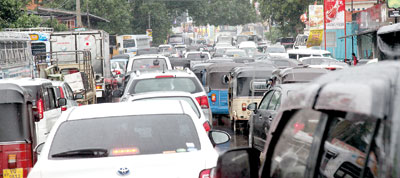News
Motorists voice concerns about new technology to monitor vehicles
View(s):Several vehicle-user associations raised concerns over the decision to use Radio-Frequency Identification (RFID) technology to monitor vehicles.

The RFID tag which is a tin foil, will be included inside the Windshield sticker issued with the number plate
Many of the associations said their awareness regarding the new technology is insufficient.
All Island Three-wheeler Drivers & Owners Association President Sudil Jayaruk, while adding the project will be important for the security of both passengers and three-wheeler driver, said it should not be an additional burden for the poor people.
He said it is unfair for the additional costs of the programme to be borne by the motorists.
“We are not sure if there are any underhand companies involved in the project, to collect money from the motorists,” he added.
Ceylon Motorcyclists’ Association President Chirantha Amerasinghe said there are issues regarding the privacy of the people and the security of the data obtained from the technology.
“We do not know how the data collected from this system will be used in the future. They have not explained the intention of the project and have not given a clear picture of it to the vehicle users,” he added.
All-Island Inter-District School Children’s Transport Service Association Chairman N.M.K. Harischandra Padmasiri pointed out there are many other simple but important activities that should be done before implementing these kinds of things. He noted there are many places within Colombo city, where basic traffic signs or pedestrian crossings are lacking, which the Govt should give priority to in the transport system.
Mr Padmasiri added that the relevant authorities did not have any discussions with them, to at least give a basic idea about the system.
Meanwhile, CMC Traffic Engineer Manjula Kularathna said the technology they initially planned to be used in the car parks with smart meters, would slightly differ from the new RFID technology to be used for the number plates.
He said they earlier planned to use the Number Plate Recognition (NPR) which uses a character recognition technology to read the number plates of the vehicle, to track down the vehicles when they have not paid the relevant fee of the smart meter. He noted however, that the RFID technology will be easier to use.
“But we have ample time to make the relevant changes for the implementation of the smart meter project, as it will take a longer time to fix RFIDs to all the vehicles in the country,” he said. Mr Kularathna also added that, until all the vehicles are fixed with the RFID tag, they can install two cameras in the enforcing vehicle, one with RFID and other with NPR, if necessary.
D. Tushara F. Suraweera Commissioner (Information & Communication Technology) of the Department of Motor Traffic, emphasised that, RFID technology is not similar to GPS tracking, and a vehicle can only be identified when a vehicle comes close to a reader.
He added that, according to the new technology, the RFID tag which is a tin foil, will be included inside the Windshield sticker issued with the number plate.
“The tag would include a unique reference number that can be read by handheld readers or, by fixed readers,” he said.
He added many advantages could be obtained from the new technology in the future, including analysing vehicle information such as traffic survey, vehicle insurance, valid licence from the readers.
“But the two main advantages we expect from the new system are traffic management and law enforcement,” he added.

